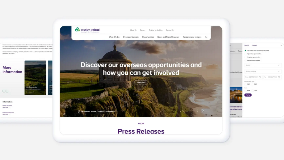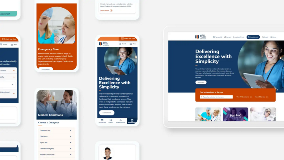Quality Assurance
Transforming testing with automation, AI, and connected tools and methods.
At Arekibo, quality assurance (QA) has evolved beyond manually identifying and fixing bugs. We are focused on using innovative processes and techniques to meet the highest functionality and performance standards. Our objective is to equip our team and clients with robust, scalable, accurate solutions that continually deliver innovation and efficiency.
Client spotlights
Our QA process focuses on
- QA first - We incorporate early testing and assessments at the start to drive continuous improvement.
- 360 view - We leverage data analytics, machine learning, and intelligent test management to create more adaptive, efficient testing frameworks.
- Manual vs. Automation - Automation is a cornerstone of modern QA, but we still perform manual testing to ensure quality controls and standards.
- Harness automation - We use automation to provide consistent, reliable results, reduce redundancy, and improve test coverage across multiple platforms and devices.
- Release cycles - We integrate automated test scripts, continuous integration/continuous deployment (CI/CD), and regression testing into our delivery process.
- AI-Enhanced - AI is helping us predict potential defects, optimise test cases, and automate repetitive tasks.
- Analytics & insights - We use predictive analytics to help us prioritise testing and continually learn.
- Cost-saving - Automation and AI help reduce delivery cycles and the associated cost benefits.
QA is at the intersection of innovation, automation, and AI and is integrated into our development processes and commitment to delivering innovative and dynamic digital experiences. The results help shorten delivery timelines and enable our team to support the ambition of our global clients.
Can our QA team test your website across all browsers and devices?
Frequently asked questions from clients.
Q: What is Quality Assurance (QA) in the context of websites and digital services?
Quality Assurance (QA) ensures that your website or digital product meets the highest of standards for your customers. This encompasses browsers, devices, speed and performance, functionality of all services, usability, and security. We have a proven and structured process of testing and validation that identifies and resolves issues before your product goes live. We provide ongoing testing to ensure your services consistently deliver value to your business and customers.
Q: Why is QA and testing important for my website or digital product?
QA is so important because it:
- Detects and fixes bugs early, reducing customer issues, reputation issues and ongoing costs.
- Tests that your site performs well across devices, browsers, and operating systems.
- Ensures that your products and services deliver a seamless experience for all your customers.
- Tests for and removes security vulnerabilities.
- Protect your brand reputation by avoiding unnecessary issues, downtime or errors.
3. What types of QA and testing services do you provide?
We provide a comprehensive QA and testing service that includes:
- Functional Testing to ensure all features work as designed, developed, and intended.
- Performance and load testing for site speed and stability under high traffic loads.
- Cross-browser and device compatibility testing.
- Security testing to identify vulnerabilities.
- User Experience (UX) testing for all key interactions.
- Automation testing for faster regression cycles.
4. Can you test an existing website or only during development?
Yes, we can test both:
- Websites, apps and services already live to identify and resolve existing issues.
- Websites under development to ensure quality at every stage before launch.
- We then provide ongoing testing, working with your internal development teams.
Q: Do you support testing for mobile apps as well?
Yes, we do. Our QA team tests mobile applications for iOS and Android platforms. We work with our clients' internal delivery teams and external app developers to ensure functionality, UI consistency, and performance on the agreed OS and devices you have developed for.
Q: What tools and technologies do you use for QA and testing?
We utilise a range of industry-leading tools, including Selenium, BrowserStack, and automated CI/CD integrations, to deliver efficient and reliable testing results.
Q: How do you ensure my website is secure?
We partner with security experts or your designated security partners to conduct comprehensive security testing, including vulnerability scanning, penetration testing, and compliance checks (e.g., GDPR, OWASP Top 10), to protect against data breaches and cyberattacks.
Q: Can you integrate QA into our existing development process?
Yes, we do this with our clients' internal teams. We work collaboratively with your development team to integrate QA into your workflow, whether you use Agile, Waterfall, or a hybrid approach.
Q: Do you offer ongoing QA support after launch?
Absolutely. We provide post-launch monitoring, maintenance testing, and regular audits to ensure your digital services remain high-performing and secure over time. Our service, ArekiboCare, delivers a comprehensive support offering that includes ongoing quality assurance of your digital services.
Q: What is the difference between manual testing and automated testing, and what do you recommend?
We provide both, and each is beneficial for specific aspects of your product and services.
In summary, manual testing involves our QA testers exploring your website to uncover issues and manually testing features and functions. We use automated testing to quickly run repeatable tests more efficiently. We use both and recommend a blended approach depending on your project’s complexity, budget, and timelines.
Why comprehensive QA matters
Comprehensive quality assurance ensures the Business and Strategy teams have a online presence that delivers a seamless experience that supports product quality, customer satisfaction, and enhances your brand reputation. The benefits include:
- Increased satisfaction - Deliver high-quality products that meet user needs and reduce frustration.
- Reduced costs Prevent expensive post-release fixes by identifying issues before launch.
- Product-market fit - Ensure that the product meets market demands through usability and performance testing.
- Market adaptation - Quickly respond to user feedback and market changes with ongoing QA processes.
- competitive advantage - Stand out by consistently delivering reliable and high-quality products.
Quality assurance support Finance and Operations teams by ensuring all interactions are fully tested, reducing risks, optimising costs, and ensuring all customers have a seamless experience. The benefits include:
- Cost efficiency - Save money by catching issues early and reducing the need for costly post-launch fixes.
- Risk mitigation - Minimise the risk of financial loss from defective products or security breaches.
- Compliance assurance - Ensure compliance with industry standards and regulations through thorough testing.
- Operational efficiency - Streamline release processes by ensuring software is ready for deployment on time.
- Resource allocation - Allocate resources effectively by reducing the need for ongoing fixes and updates.
Quality Assurance and Testing support marketing by ensuring the product meets user expectations and delivers on brand promises. Here’s how it benefits marketing:
- Better user experience - Provide a seamless experience that aligns with marketing messaging and promises.
- Reduced negative feedback - Minimise complaints and negative reviews by releasing high-quality products.
- Stronger brand image - Reinforce brand reliability by consistently delivering dependable products.
- Improved customer loyalty - Build trust with users by meeting quality expectations and reducing issues.
- Optimised product launches - Ensure smooth launches by avoiding last-minute issues that could harm the brand.
For Technology and Support teams, comprehensive quality assurance are critical for maintaining software stability, security, and performance. The benefits include:
- Early detection - Identify and address issues early in the development process to avoid technical debt.
- Improved quality - Enforce coding standards and best practices through rigorous testing.
- Enhanced security - Conduct security testing to detect vulnerabilities and protect data.
- Optimised performance - Ensure that the software performs well under different conditions and user loads.
- Reduced maintenance - Minimise the need for frequent patches and updates by ensuring initial quality.


/ibec-quality-assurance-qa-testing.tmb-.webp)
/bt-qa-testing.tmb-.webp)